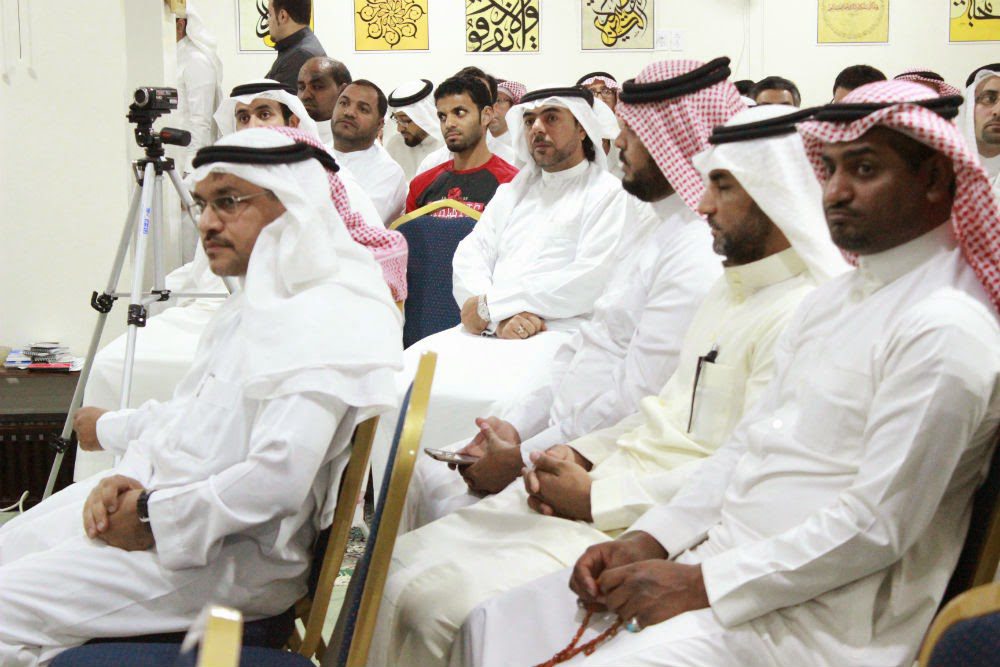A number of elite intellectuals from the Eastern province participated on November 12, in Althulatha Cultural Forum seminar on solidarity with al-Ahsa victims who were killed in the terrorist attack. Participants included Abdullah Shbat, Najeeb Al-Zamil, Khaled Al-Badawi, Khalail al-Fezia, Adnan alShukas and Dr. Tawfiq alsaif.
At the beginning of the seminar, Zaki Al-Baharna, the moderator, delivered a solidarity speech about the heinous crime, referring to the unprecedented national and international reaction with this massacre, where many senior officials participated in the funeral. He emphasized that this image reflects the ability of citizen’s coexistence and cohesion. Al-Baharna also called Saudi citizens to overcome the negative repercussions of this painful incident and think of constructive initiatives to enhance national unity.
Mohammed Al-Khalfan delivered a speech on behalf of Abdullah Shbat entitled “Al-Dalwah wound”, in a reference to the tragic incident, saying that “this attack aims to stir sectarian strife in al-Ahsa which known of coexistence throughout history”. He also stressed on the important role of official and media institutions in reinforcing social relations and coexistence.
On the other hand, Najeeb Al-Zamil, an ex-member in Shura Council, said that “Shias and Sunnis are components of the society, explaining that “coexistence” is not the appropriate term to be used among citizens but between those who belongs to different races and nationalities.
He stressed on the importance of combating all forms of terrorism and supporting moderate voices which call to eliminate discrimination among people, confirming that promoting national unity contributes in preserving stability and security of the state.
Dr. Khaled Al-Badaiwi, the Director at King Abdul Aziz Center for National Dialogue in the Eastern province stressed on the importance of unity and cohesion.
He reviewed models of coexistence in Al-Ahsa, pointing out that religious affiliation has never been a cause for confrontation; contrary, Shias and Sunnis have been integrating and coexisting with each other.
Al-Badawi demanded to address the causes of social tension and encouraged dialogue and communications initiatives in order to enhance the relationship between citizens.
He said that “curriculum and social media incite hatred, yet our responsibility is to spread the culture of tolerance and promote harmony among citizens.”
Chief of the Literary Club in the Eastern Province Khalil Al-Fezia said that “people of the Eastern province are known of cohesion.” pointing that sectarian conflicts were not existed before. He added that “the reaction about the last terrorist attack in al-Ahsa showed a comprehensive rejection to such violent acts.”
Al-Fezia said that “Eastern Province was characterized by coexistence, and all people have to unite in order to face current challenges”.
Dr. Adnan al-Shukhas, Ex Professor at King Fahd University for Petroleum and Minerals, said that “the terrorist attack at these tense conditions in the region requires a serious address, and the state has to enact laws criminalizing hatred in order to eliminate extremism.
He emphasized on enhancing the national unity discourse in order to face extremist groups who threaten security and stability of the state.
Tawfiq Al-Saif, a political thinker said that “there are two solutions for sectarianism, one of them is governmental and the other is social”, confirming that combating extremism is mutual responsibility. He called both Sunnis and Shiites to expose sectarian preachers through various media and social networking. Al-Saif praised the role of youth and religious scholars in combating division and discrimination.
Friday, 30 January, 2026
Trending
- منتدى الثلاثاء يناقش نشأة الحضارات الإنسانية
- القطيف تحتفي بالمفكر البليهي وتناقش نظرياته
- ثقافي / “الرؤية الإنسانية والعقل” .. ندوة بمنتدى الثلاثاء بالقطيف
- مثقفو الوطن يحتفون بتكريم المفكر ابراهيم البليهي في القطيف
- طروحات البليهي الفكرية على طاولة تشريح المثقفين
- This week’s topic: Che Content And Role Of Personal Libraries
- Althulatha Forum discusses the Scientific Inspiration and Future Orientations
- الاستاذ عبد الله البوشي – (لواء سابق)
- المهندس شفيق آل سيف
- الدكتور منصور المرزوقي
You might also like

